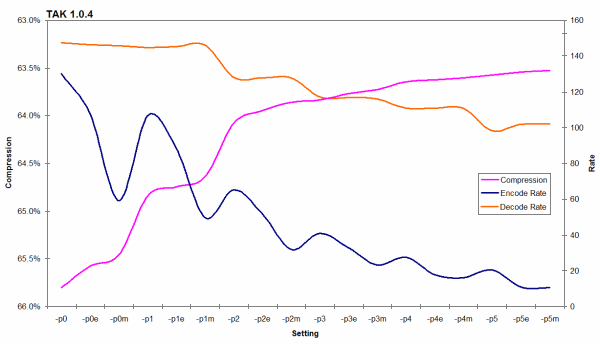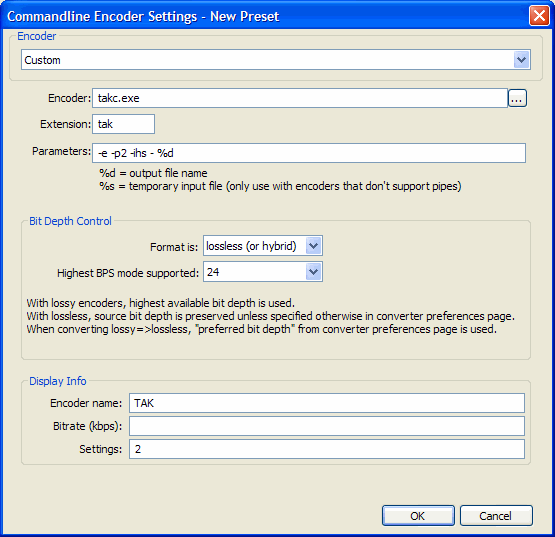TAK
| Tom's lossless Audio Kompressor | |
|---|---|
| lossless audio compression. | |
| Developer(s) | Thomas Becker |
| Release | TBC |
| Type | Lossless |
| Recommended encoder | TAK v1.1.0 |
| Website | ThBeck.de/Tak/Tak.html (german) |
Description
Tom's lossless Audio Kompressor (TAK) is a lossless audio compressor which promises compression performance similar to Monkey's Audio “High” and decompression speed similar to FLAC.
Features
- High compression
- Fast compression and decompression speed
- Streaming support (necessary headers for decompressing the audio are written to the stream every 2 seconds)
- Piping support for encoding
- Error tolerance (single bit error will never affect more than 250 ms)
- Error detection (each frame protected by a 24-bit checksum (CRC))
- High-resolution (up to 24-bit/channel) audio support
- Support for up to 192 Khz Audio
- Seeking without seek table
- APEv2 tags supported at end of file
Pros
- Fast encoding speed (while providing better compression TAK encodes as fast as FLAC -8 in TAK's “Insane” and several times faster in “Turbo” mode)
- Fast decompression speed (on par with FLAC / WavPack)
- Good compression levels (on par with Monkey's Audio High)
- Error Robustness
- Fast Seeking
Cons
- Closed Source (at the moment)
- No hardware support
- Very limited software support (playback: Winamp & foobar2000 plugins, tagging: Mp3Tag)
Hardware and Software That Support TAK
Hardware
- None
Software
Windows
- offical TAK Applications v1.1.0 (Applications, Winamp, SDK, Decoding library) here
- foo_input_tak, TAK decoder for foobar2000 here (supports tagging and Replay Gain)
- Mp3tag – universal tag editor with support for TAK
- shntool (since version 3.0.6)
Linux
- The TAK reference applications (GUI as well as commandline) are known to run on Linux via Wine.
Recommended Settings
- Default compression: “-p2” (formerly Normal) is the most attractive setting, providing an excellent compromise between compression and encoding speed. (At compression levels close to Monkey's Audio High (<0.4% difference), it is able to encode more quickly.)
takc -e [input file]
- Highest compression: “-pMax” (same as -p5m) (This will create files which are comparable in size to file created using Monkey's Audio High. Decompression speed is comparable to WavPack Normal.)
takc -e -pMax [input file]
- Fastest compression: “-p0” (This will create files which are comparable in size to Monkey's Audio Fast or WavPack High. Decompression speed is comparable to FLAC 0.)
takc -e -p0 [input file]
TAK Performance Graph

(see External Links)
Using TAK
TAK with foobar2000
- Copy the takc.exe to your foobar2000 directory
- Go to File → Preferences → Tools → Converter
- Set it up as shown:

Note: replace -p2 with the desired compression level.
- TAK introduced encoding from STDIN in version 1.0.3, eliminating the need for a temporary file and greatly improving overall compression time. If you are using an earlier version of TAK use the following command line instead:
-e -p2 %s %d
- Use APEv2 tagging (will be used as internal tagging)
TAK with EAC
Please read the wiki guide, which details how to create TAK files with EAC.
Future Features
- Unicode support
- MD5 audio checksums for verification and identification
- A German version
- Embedded cue sheets
- Embedded cover art
- Multichannel audio
Frequently Asked Questions
- Is the codec safe for use?
- Yes. To check, convert a WAVE to TAK and back and compare the two (or use foobar's bitcompare tool).
- Why should I use TAK?
- TAK offers high compression ratios with great decoding rates.
- What can I compress with TAK?
- TAK 1.0 can compress any integer-format (up to 24 bits per channel) PCM RIFF WAVE file (.wav). Piping support as of v1.0.3 is implemented, so converting lossless files to WAV first is not necessary.
- What about hardware support?
- None at the moment. Although, -p0, -p1 and -p2 are the candidates for hardware playback.
- When will the source be opened?
- Yes, TAK will be open-source, as soon as the code is ported to C or C++ and documented. However, Thomas has mentioned that he would like to improve the codec before opening the source.
External Links
- thbeck.de/Tak/Tak.html – Official Website (german)
- TAK 1.1.0 Release Announcement / Discussion Thread on HA (english)
- TAK 1.1.0 Downloads
- synthetic-soul.co.uk/comparison/lossless – Comparison with Other Codecs (by Synthetic Soul)
- flac.sourceforge.net/comparison.html – An Updated Comparison (from FLAC Homepage)
